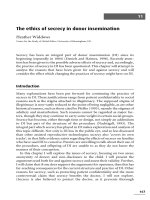the advancement of science in brave new world
Bạn đang xem bản rút gọn của tài liệu. Xem và tải ngay bản đầy đủ của tài liệu tại đây (34.09 KB, 3 trang )
Christy CampbellMrs. DoigEng OAC 216 May, 1996The Advancement
Of Science In Brave New World When thinking of progress, most people
think of advances in the scientific fields, believing that most discoveries
and technologies are beneficial to society. Are these advances as
beneficial as most people think? In the novel Brave New World, the
author Aldous Huxley, warns readers that scientific advances can be a
threat to society. This is particularly evident in the fields of biology,
technology and psychology. According to Huxley, "The theme of Brave
New World is not the advancement of science as such; it is the
advancement of science as it affects human individuals"(Huxley CLC 79
290). One scientific advance of which Huxley warns readers of is that in
biology. In the setting of Brave New World, henceforth referred to as the
reservation, the mass production of humans is accomplished with the
Bokanovsky process. In this process, human beings are genetically
engineered in laboratories. " a bokanovskified egg will bud, will
proliferate, will divide. From eight to ninety-six buds, and every bud will
grow into a perfectly formed embryo, and every embryo into a full sized
adult"(Huxley Brave New World 4). One of the threats of this genetic
breeding is that no family structures exist on the reservation. Instead,
humans are raised in conditioning centres. R.T. Oerton points out that
"Present knowledge indicates, for instance, that a child cannot be
deprived of parents or parent figures, as were the children in Brave New
World, without suffering lasting pathological damage to his
personality."(Oerton CLC 7 308). Another threat that the Bokanovsky
process poses to society is that life is not highly valued. "Murder kills only
the individual and, after all what is an individual? With a sweeping
gesture he [Mr. Foster, director of hatcheries and conditioning] indicated
the rows of microscopes, the test-tubes, the incubators. We can make a
new one with the greatest ease-as many as we like"(Huxley Brave New
World 133). Human life holds no value because it can be easily replaced
through the Bokanovsky process. Furthermore, Bokanovsky's method of
mass production prevents individuality, as on the reservation, all people
are cloned. Starting from the time of decanting, each embryo is
genetically cloned to fall into one of the various social classes. Within
each social class, all members are cloned to be intellectually and
physically equivalent. Biological technology helps to achieve this equality
by genetically shaping the minds of society. In Brave New World , one's
intelligence depends on the amount of alcohol injected into their embryo.
For example, one of the lower classes in society, Epsilons, have quite a
high amount of alcohol injected in the decanting process. Mental faculty,
therefore, is predestined from the moment of cloning. By creating a
world where humans are mass produced, Brave New World
demonstrates that advances in biology can be dangerous if used without
regard for the well being of the human race. According to Huxley,
advances in technology can also be a threat to society. In Brave New
World, everything is completely mechanized, eliminating the need for
creativity and imagination. Huxley warns us against mechanization,
arguing "the machine dehumanizes men by demanding mechanical
efficiency of them"(Hillegas 114). Man's creativity is replaced with
mundane tasks, because machines are able to do much of the work . The
occupations available for people on the reservation, consist of repetitive
mechanical operations. In Brave New World, leisure activities are
dominated by technology. The primary source of entertainment is the
"feelies," a type of movie theatre in which all the senses are artificially
created. Instead of feeling the emotions portrayed on screen, the
audience absorbs stimulated sensations. These stimulations prevent
them from free thought, which threatens society by denying people from
experiencing their own creativity and imagination. Furthermore,
technology affects entertainment by being incorporated into all games of
play. Games consist of advanced technological apparatus, and low
organization, creating very superficial entertainment. According to
Huxley, this frustrates one of humanity's vital needs to be creative. "Men
no longer amuse themselves creatively but sit passively amused by
mechanical devices"(Hillegas 115). Among technological advances, one
danger Huxley warns of is the advance in pharmacology. In Brave New
World, an artificial form of happiness is present in a drug called soma.
Soma propels the user into a hallucinatory dream world, providing relief
from negativity, allowing constant happiness People are rewarded for
work by receiving rations of soma. The soma ration varies according to
the social classes, with the lowest classes receiving the least, and the
highest classes receiving the greatest. Society is conditioned to believe
that "One cubic centimetre cures ten gloomy sentiments"(Huxley Brave
New World 53). This reasoning deceives the user into believing that soma
is a cure-all remedy. Since soma has no side effects, it can be a threat to
society because people may be drugged into a hallucinatory dream world
twenty-four hours a day. It could be used as a drug not to escape the
pressures of life, but to escape life itself. Similar to biology, technology
can be a danger to society if used without regard for the welfare of
mankind. Finally, the most dangerous of all scientific advancements
Huxley warns of, is the progress in psychology. In Brave New World,
every person is conditioned. The first conditioning technique used is
subliminal training. This type of psychology is utilized to program ideas
into individual's minds by a method called hypnopaedia. Hypnopaedia
consists of repetitious messages that play over a loudspeaker during
sleep. These repetitions are composed of socially accepted morals and
values. "All conditioning aims at making people like their unescapable
social destiny."(Huxley Brave New World 13). This limits individuals from
exploring life and developing their idea of happiness when "happiness" is
already predetermined in their minds. According to Huxley, his " chief
strategy was to show that the conditioned happiness of Brave New World
cuts men off from deep experience, keeps them from being
human."(Hillegas 118). Direct stimulation is used as another conditioning
technique. On the reservation, society is conditioned against love,
nature, literature, and other forms of expression that are naturally desired
by man. To condition babies against nature and literature, they are mildly
shocked while encountering books and flowers placed before them.
Therefore, this direct stimulation causes them to have an instinctive
hatred of flowers and books. According to reservation controllers, "A love
of nature keeps no factories busy"(Huxley Brave New World 19). Morals
and values, which normally through the growing up process can be
discovered on their own, are brainwashed into society's minds. This
direct stimulation is harmful to society as it prevents people from
deciding upon their own morals and values. Another form of conditioning
in Brave New World deals with death. From the early age of eighteen
months, children are exposed to death while playing with toys and eating
candy. Thus resulting in an eternal association between happiness and
death. Death conditioning can be dangerous to society as children
become unable to distinguish between good and evil. In addition, sexual
conditioning is present in Brave New World. From a very young age,
sexual play is normal and encouraged in everyone. Together, hundreds
of children play sexual games in the nude. Also, more than one sexual
partner is encouraged, resulting in the absence of committed
relationships. This absence of committed relationship creates a world
without deep feelings of human affection. Society is conditioned to
believe "Everyone belongs to everyone else"(Huxley Brave New World
35). Unfortunately, these psychological advancements cause the
reservation to be a world without individual thought. Each person is
conditioned into a life, which is believed to be most advantageous for
them. Thomas D. Clareson points out that "The Brave New World is
mindless it's citizens are 'nice tame animals' "(Huxley, DISC). The
conditioning methods in Brave New World take away all freedom of
choice and decision in society. The society depicted in Brave New
World is to many, a frightening one. Though, it may be more of a reality
than is presently thought. Society must ensure that science is changing
to suit human needs, rather than changing the human race to suit
science. With the increasing progress in biology, technology and
psychology, this may be an impossible feat to overcome. The world may
one day be without individuality, emotions or free thought. In Brave New
World, the scientific advances show to be a threat to society, where "One
could of course, exist. . ." though, " One could not-in the fullest sense of
the word-live in it."(Wright 87).









